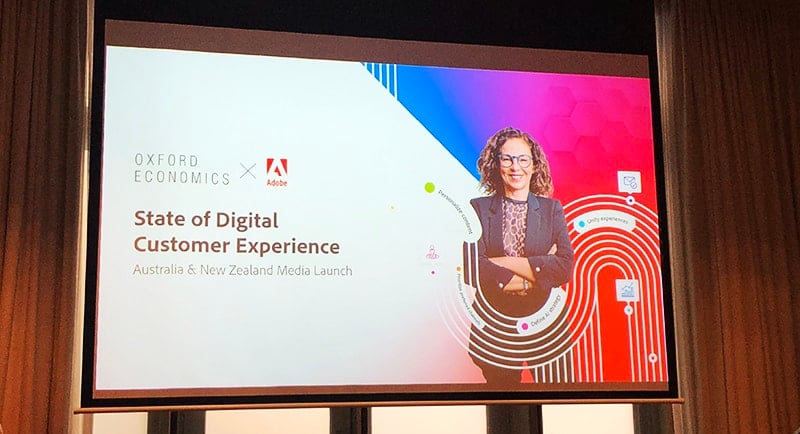On Thursday, Adobe launched its State of Digital Customer Experience report at Sydney’s Hyatt Regency.
The research has been derived from a global survey of 4,000 consumers and 1,500 executives and direct reports (collectively referred to as ‘brands’). The survey, conducted by Oxford Economics, was in field between June and August 2023.
The Australia and New Zealand analysis comprises a sample of 200 consumers and 75 executives.

David Thomson Photography
The Findings
According to the report, around 4 in 10 ANZ consumers (39%) would choose an AI-enabled tool or service over a human interaction. Many more want both options to be available, particularly when exploring new products and services.
Despite these preferences – and many ANZ consumers predicting CX benefits from generative AI – brands are falling behind global peers. Only 6% are deploying or piloting generative AI to enhance CX initiatives compared to 18% globally.
Brands in Europe and the US are also around twice as likely to already have dedicated AI budgets, and internal usage policies are more than three times as prevalent.
However, ANZ brands are working towards improving their generative AI capabilities in the next 12 months, with 43% saying it is their primary CX focus.
“Preferences for AI-assisted brand interactions are emerging as consumers see the potential benefits of generative AI. While ANZ brands are slower to launch generative AI initiatives than others globally, it’s their number one strategic focus for enhancing customer experience,” said Katrina Troughton, vice president and managing director for Adobe ANZ .

David Thomson Photography
ANZ consumers are more data-conscious
The majority of ANZ consumers (58%) want brands to offer the same level of personalisation online and in-person, however meeting this expectation remains a challenge for brands.
“Consumers say personalised experiences leave a lasting impression, but most brands struggle to deliver them. Delivering a great experience relies on connected data and insights, acted on in real-time. But with consumers acutely aware of data security and privacy issues, brands must prioritise responsible practices to hold on to customers,” said Troughton.
Both consumers and brands agree that data privacy and security concerns constrain personalisation. Brands say consumer reluctance to share data is a top barrier behind inaccurate data collection.
However, they underestimate the impact of data missteps. Over two-thirds (68%) of consumers will stop or consider not buying from a brand that isn’t transparent about personal data use, but only 40% of brands believe it impacts retention.
Consumer attention on data practices extends to generative AI. ANZ consumers are the most worried of any location that, as brands use generative AI, their personal data will be used without consent (63%). They are also among the highest globally to believe that too much data about their behaviours will be collected (62%).
Across ANZ, Adobe found that many brands are yet to respond to the need for stronger AI guardrails to meet consumer expectations and ensure trust isn’t compromised. Just 3% of brands have ongoing or completed initiatives to create internal usage policies, while 5% have created a working group tasked with considering it.
Diving Deeper
The morning finished with a panel moderated by Troughton, speaking to Eric Hall (senior vice president for Adobe Customer Solutions), Jane Fernandez (COO Australia, FIFA Women’s World Cup), and Davy Rennie (National MD for DDB’s tech and digital arm, Tribal).
Speaking about why ANZ may be more hesitant than other markets, Rennie told the room that “We’ve seen a number of high-profile cases where data hasn’t been entirely secure, and I feel there’s a healthy scepticism from consumers about organisations doing the right thing.
“So when we’re reviewing our policies of GenAI, it’s in line with existing security policies that do place data security at the heart of the organisation, which will never be a bad thing. If it does take a little bit longer for us to figure things out, then great, because we don’t want to be an early adopter and jump in with two feet at the shallow end, and then we’ve got a mess to clean up as we go.”
See Also: What consumers are expecting of brands using generative AI
